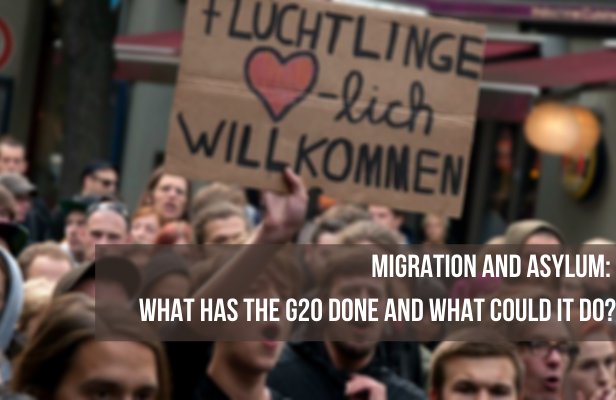Migration and Asylum: What Has the G20 Done and What Could It Do? Commentary / Güven SAK

For World Refugee day, the United Nations High Commissioner for Refugees (UNHCR) released its 2019 report on forced displacement. Its numbers are staggering. There are 79.5 million forcibly displaced people around the world, 45.7 million of whom are internally displaced people (IDPs), 20.4 million are refugees and 4.2 million are asylum seekers.
With the COVID-19 pandemic, the issue of forcibly displaced people has gained an additional urgency for three reasons.
First, the vast majority of the 4.5 million Venezuelans, 6.6 million Syrians, 2.2 South Sudanese, 2.7 million Afghans, and 1.1 million Rohingya who have had to flee their homes are located in neighboring countries. This shows that forced displacement across the world is a regional issue necessitating global action. The platform to address this problem is the G20.
Second, despite rising nativist discourse in developed countries, forced migration is first and foremost a developing country problem. Developing countries host 86 percent of those forcibly displaced from their homes. As the pandemic is squeezing growth and job creation, this is going to become an even heavier burden to bear. Under pandemic conditions, integrating forcibly displaced immigrants into the labor markets of the hosting developing countries, and turning those countries from transit into destination countries is becoming more difficult.
Third, migration is generally an urban problem. Urban centers offer greater job opportunities, and therefore attract more immigrants. The already overcrowded cities in developing countries thus become less manageable under pandemic conditions, and are already the frontlines for a social clash between locals and immigrants. This is where local leadership, not new laws, plays a critical role. Turning migration into a domestically contentious political substance in hosting countries prevents local leadership from implementing coherent integration policies. This makes social cohesion even more difficult to sustain in the urban centers of the developing world.
The G20 needs to take a more active stance to address the emergency in hosting countries. This is a moment where cooperation between agents, not competition amongst them, is essential. We have a classic collective action problem a la Mancur Olson, and it can only be addressed multilaterally.
So what should the focus of the G20 be in today’s COVID-19 environment?
First of all, humanity needs to cooperate to develop vaccines and medication, as well as an effective distribution channel around the world. We already know that a solution in one country is not sufficient, and that we have to come out of this as a collective. Developing parts of the world are going to require more support than developed ones. The G20 has to cooperate with the World Health Organization (WHO) in the development and distribution of the awaited vaccines and medication.
Second, we must understand that, left to their own devices, corporations will deepen digitalization and robotization, especially in this era of cheaper credit. This will cost more jobs and increase the possibility of social tension in the hosting developing countries. We must avoid this scenario by investing in strong public expenditure programs for growth and job creation. This is relatively easy in developed countries, but harder in especially highly indebted developing countries. Here, G20 needs to cooperate closer with the World Bank and the International Monterey Fund (IMF) to strengthen domestic stability in hosting developing countries.
Third, and in order to avoid Argentina-like debt defaults created by court action, we need to establish a solid global sovereign debt restructuring mechanism. In their fight against COVID-19, countries need not only debt rescheduling, but also new debt. The G20 should lead global cooperation by creating a new global sovereign debt restructuring mechanism under the guidance of the IMF.
So far, the G20 has only been raising awareness about the issue of global migration. It needs to do more. The group has saved the global north in the aftermath of the 2008 American financial crisis. Now is the time for G20 to save the global south. This group, and this format, can coordinate a truly global response to the collective action problem the world now faces.














